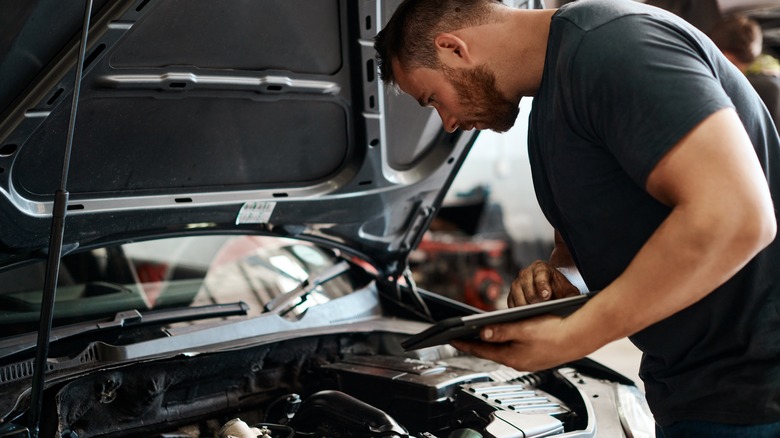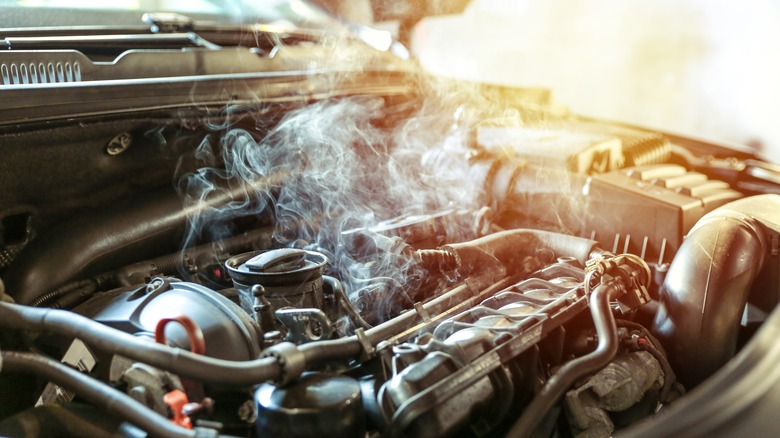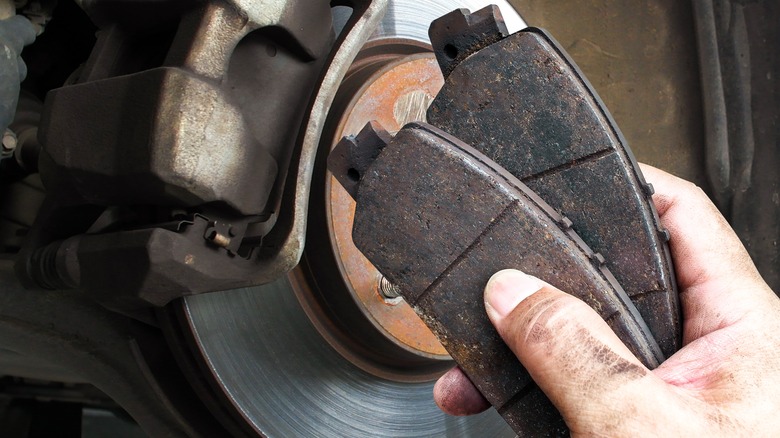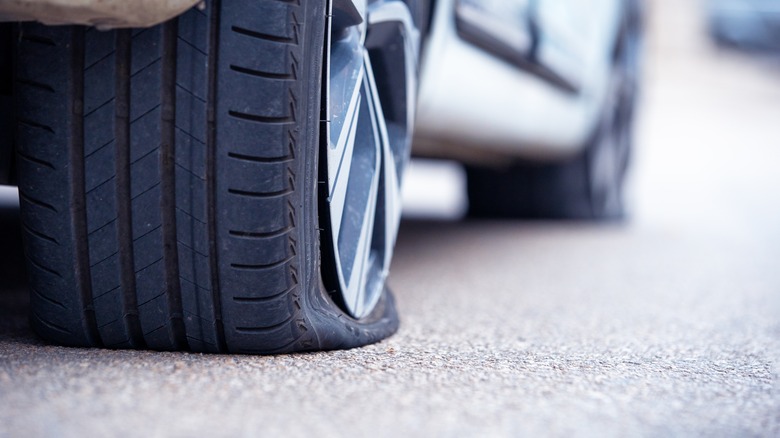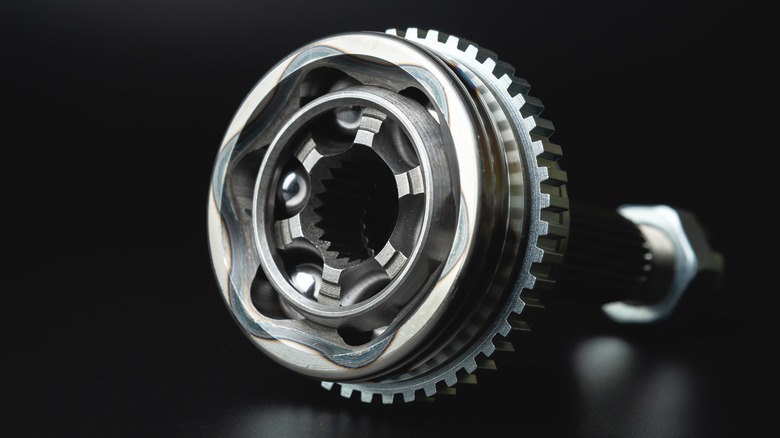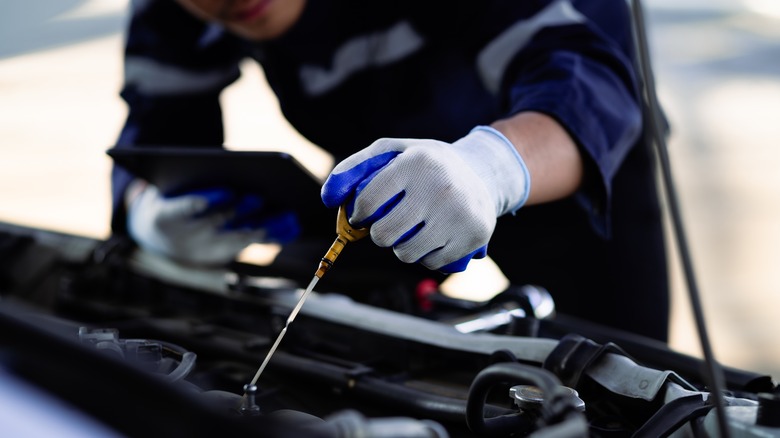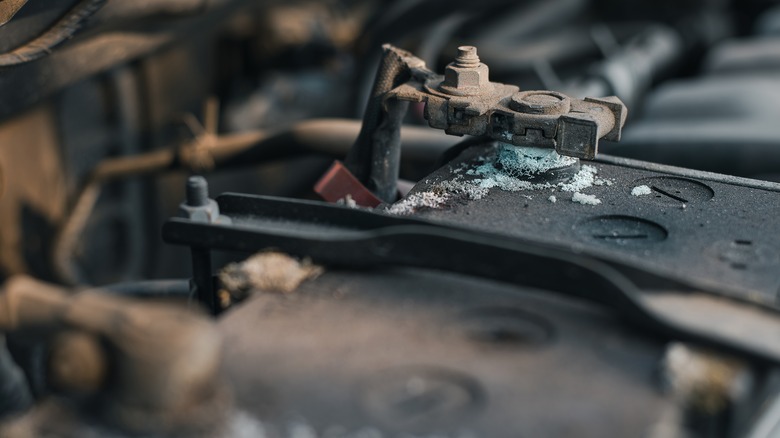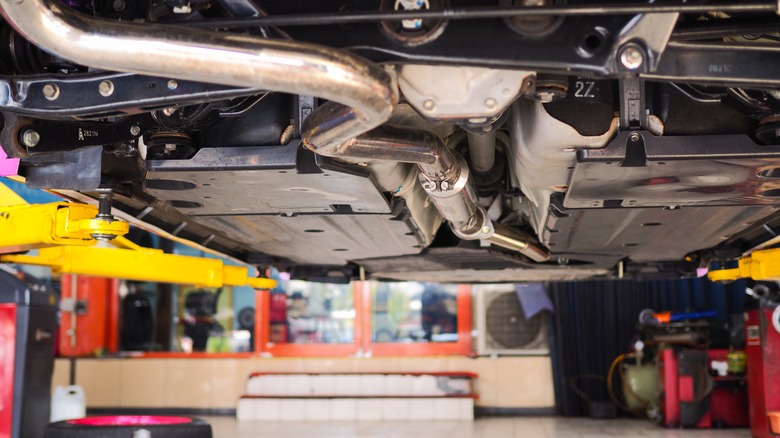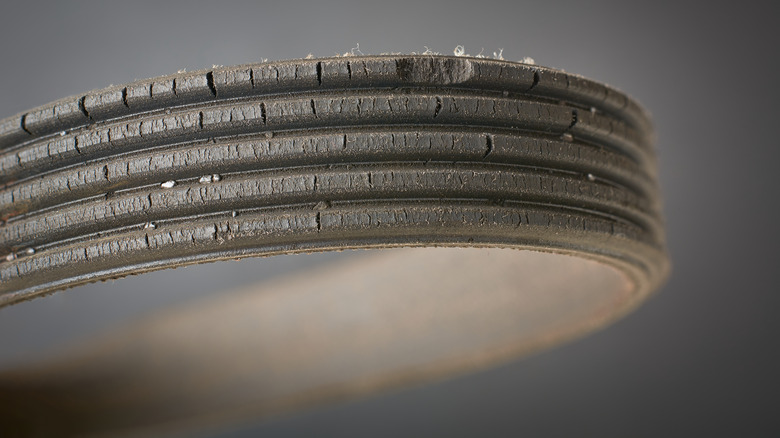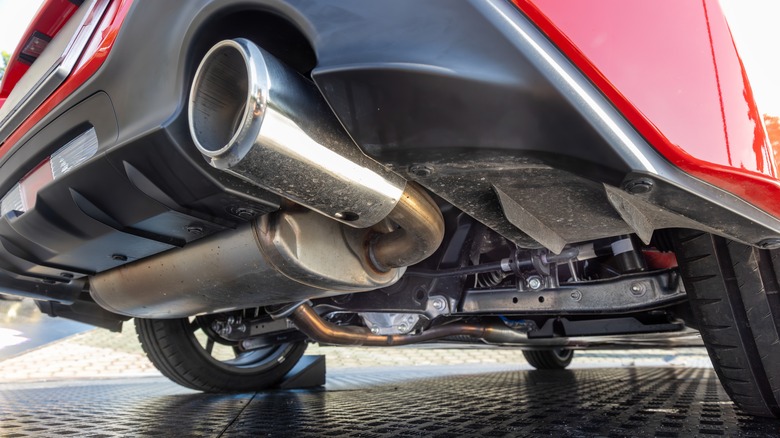10 Bad Car Sounds You Might Hear While Driving, And What They Could Mean
Cars make all kinds of noises, even when they're operating correctly. You turn the key and the engine fires up with a consistent and satisfying rumble. Horns beep, doors slam, and your car's interface plays all kinds of noises to let you know when fuel is low, you're in danger of running into something, or you've forgotten to put on your seat belt. Then there are other times when your car makes noises it's not supposed to make.
Most of the time, the noises your car makes are perfectly ordinary, but an unusual sound might indicate a problem requiring maintenance. Every noise is a form of communication from your vehicle, letting you know that everything is just fine or that something is amiss. You'll have a better shot at making it safely and smoothly down the highway if you pay attention to your car's soundscape and understand what those sounds could mean. If you're looking for a primer on car communication, here are some of the most common sounds you might hear while driving and what they might mean.
Hissing under the hood
In the animal kingdom, hissing is a sign of distress and that's true of cars too. Hissing under the hood could mean a few different things, depending on where the sound is coming from and whether you hear it during operation or after shutting off the engine. The usual suspects are issues in the cooling or exhaust systems, or sometimes even leaking hoses.
As the name suggests, the cooling system works to keep your vehicle engine cool by regulating its temperature, getting it up to operating heat and preventing it from overheating. When fuel combusts in the engine, it creates pressure that moves the pistons and also generates heat. That heat is absorbed by the liquid coolant, which circulates through hoses between the engine and radiator, where it's released as hot air. To work correctly, the engine, radiator, water pump, cooling fan, hoses, and thermostat all need to work in sync. If one or more of those parts are damaged the engine could overheat, causing fluids to sizzle and hiss.
Damage to the exhaust pipe, exhaust manifold, or gaskets could also cause hissing. Alternatively, hissing might come from damaged hoses, allowing fluid to escape through cracks and pinholes like air escaping a pinched balloon. Popping the hood could point you toward the source, just look for steam and be careful not to touch hot engine components.
Grinding near the tires
Worn brake pads are the most common cause of grinding near the tires, but it might also indicate a larger problem with the brake system. Brake pads are made of friction material attached to a steel backing plate. Most of the time, they hover just over the wheel rotors, but when you press the brake pedal, they make contact with the rotors and apply pressure. The resulting friction reduces the speed of your car to a slow or a stop, and the brake pads get worn down in the process.
Brake pads typically need to be replaced every couple of years, depending on their quality and how much you drive. As the pads wear down and the friction material thins, you'll start to hear a squeaking noise. That's by design, a sonic warning letting you know it's time to replace the pads. If they aren't replaced soon and continue to wear down, the steel backing plate will grind against the rotors, causing damage.
Less common causes of grinding are faulty wheel bearings, rusted or damaged rotors, or lack of lubrication. If you hear grinding while you're driving (not braking), there might be pebbles or other debris trapped between the brake pads and rotors. No matter the cause, if you hear grinding, get off the road and inspect the wheels and brakes to prevent further damage.
Thumping from the tires
A car doesn't have to get you where you're going smoothly, but it helps. If your car is thumping as you drive down the highway, it could be a problem with the tires, wheel assembly, or related systems. When properly installed and inflated, your car's tires will carry you gently down the road. If your car is thumping down the road, it's probably one of a few common problems.
The most common cause of tire thumping is a flat or popped tire. If that's the case, you should be able to tell with a quick look, and you can fix the problem by reinflating or replacing the tire. If the thumping correlates to the speed of the turning tire (i.e., the frequency increases as you speed up), that also suggests a tire issue. You might have run over something and it's embedded in the tire, every time the tire turns, the object hits the pavement and makes a noise.
Have you hit a curb recently? Thumping could also suggest a bent wheel. Loose lug nuts are another common culprit. If the lug nuts aren't properly tightened, the wheel won't be held snugly, causing a wobble when you drive. Something similar can happen if the tires aren't balanced correctly. Finally, thumping could be caused by a problem with your car's suspension. If damaged, your car can't handle the bumps and dips in the road as smoothly, and you'll have a bumpier, thumpier ride down the road.
Engine knocking
Inside your engine, fuel gets mixed with air, compressed, and then ignited by the spark plugs. The resulting combustion translates into kinetic energy by pushing a piston to move you down the road. If you hear engine knocking (a pinging noise or repetitive tapping) while accelerating or maintaining speed, it could mean your engine is getting an incorrect air-fuel mixture, has faulty spark plugs, carbon deposits, or is using the wrong fuel type. Engine knocks can vary in frequency and volume depending on the cause and severity.
If the spark plugs are faulty, they may not ignite the fuel mixture evenly, causing the engine to knock. Meanwhile, gasoline has carbon in it, which can create deposits inside your engine. These deposits can create hot spots, causing uneven fuel burn.
Engines are designed to combust fuel in a controlled way. Knocking indicates a loss of control, as unburned fuel ignites out of sync with normal engine operations. That can be caused by using a fuel with the wrong octane rating or by getting an uneven fuel-air mixture. A malfunctioning sensor or other fuel delivery system problems can result in too much air in the mixture, a bad burn, and an engine knock.
Clicking or popping when turning
If your car clicks or pops when you turn, it could mean that one or more of your CV (constant velocity) joints — or even the entire CV axle – are damaged. CV joints connect the transmission to the drive shaft and the drive shaft to the wheel. When they get worn down, they can't do their job correctly, and you hear knocking. You'll want to address any damage quickly to avoid more severe problems down the line.
CV joints transfer torque from the transmission to the drive wheels, maintaining a constant speed while accounting for turns and the up-and-down motion of the suspension. There are inner CV joints connected to either side of the transmission and outer CV joints connected to each wheel, with the drive shaft in between. These joints allow the wheels to turn and the suspension to move, keeping a constant velocity regardless of the angle or length of the drive shaft between the transmission and the wheel.
Damage is most common on the outer CV joint. Cracks in the boot let grease escape while moisture and dirt get in, leading to corrosion, loss of lubrication, and eventual failure. If you catch the damage early, a little grease refill and a new boot usually fix the problem. Otherwise, you might have to replace the CV joint, or even the entire drive shaft.
Ticking from the engine
A ticking sound from your engine could be totally normal or indicate a wide variety of problems. If your vehicle uses direct injection (standard in diesel engines and increasingly popular in modern cars), clicking is just par for the course. In a conventional engine, fuel is delivered to the intake port, where it mixes with air and passes through the intake valve into the cylinder. Direct injection engines bypass those steps and inject fuel directly into the cylinder. It's more efficient, using less fuel and dumping fewer emissions into the environment.
If your car doesn't use direct injection, ticking could indicate low oil level or oil pressure. When oil pressure or level drops, engine components don't get the lubrication they need, and parts get noisy. If they remain unlubricated, the risk of damage is considerably higher. If you hear ticking, get it checked out as soon as possible to prevent more complicated problems in the future.
Ticking could also suggest a leak or crack in the exhaust system, a failed bearing in the AC compressor, water pump, or other engine components, or something as simple as a chipped engine fan. Popping the hood could reveal the source of the noise, and a mechanic can help you diagnose the cause.
Clicking when trying to start
Fast clicking is a classic sign there's something wrong with the battery. It might be drained from leaving the lights on all night and just need a jumpstart, or it could be completely dead and need to be replaced. It might also be a symptom of a problem a little further down the line.
The first place to check is the battery terminals. Your battery might be perfectly fine but unable to transmit power because the terminals are corroded or loose. Hydrogen gas reacts with chemicals in the battery casing, creating a liquid that leaks out and collects at the terminals, limiting contact. If you see corrosion, you can clean it with a toothbrush and a mixture of baking soda and water. In a pinch, you can use cola, thanks to the phosphoric acid. Corrosion can irritate the skin and eyes, so make sure you wear appropriate safety gear whenever working on your car.
The battery provides a big boost of power up front to start the engine, and it's the alternator's job to recharge the battery as you drive. As the car operates, the engine rotates a pulley attached to the alternator, generating electricity to recharge the battery and power the car's electrical systems. If the alternator belt breaks or the alternator fails, your battery will quickly run out of juice.
Rattling while driving
Rattling while your car is in motion could mean any number of things, depending on where the noise is coming from and when it happens. Before you break out the tools and headlamps, check the interior for the source of the rattling. Everything from pocket change to pens, pencils, sunglasses, tire pressure gauges, and more has a way of collecting inside a car. Any one of them could get loose and rattle around while you're driving. Check the glove box, cup holders, dashboard, door pockets, beneath the seats, and the trunk for loose items or panels.
If the rattling comes from under the car, it could be caused by loose or corroded exhaust components or heat shields. If something comes loose, it might rattle against other metal components beneath your car while you drive.
Another common culprit is the catalytic converter, which transforms pollutants into less harmful compounds, reducing emissions as you drive. The catalytic converter typically contains a ceramic structure coated with one or more metal catalysts. It's often designed in a honeycomb shape to maximize surface area and facilitate the conversion of pollutants. If parts of that structure break, they can rattle around when you're driving and reduce your car's ability to clean its emissions.
Squealing under the hood
The serpentine belt is the most common cause of squealing under the hood. You'll notice the squeal when you fire up the engine; it will be persistent and get worse when accelerating or making sharp turns. Fortunately, a damaged serpentine belt is relatively easy to diagnose and replace.
Also known as the drive belt, the serpentine belt connects to the engine and is powered by the crankshaft pulley. It winds its way through the engine (hence the name), connecting to other components including the air conditioner compressor, alternator, power steering pump, and water pump. If your serpentine belt is damaged, those systems may not work properly. Keep an eye out for additional symptoms like difficulty steering or trouble with the AC, in addition to squealing.
Serpentine belts are designed to last a long time (between 60,000 and 100,000 miles), but they don't last forever. They have grooves that help them sit into the pulley and wrap around engine components. Over time, the belt can crack, fray, and loosen, causing it to slip. Squealing is a sign it's time for a replacement. Replace a damaged serpentine belt as soon as you can, because a squealing belt won't prevent you from driving, but you'll be stranded if it breaks on the road.
Roaring sound when accelerating
If your car rumbles or roars while in operation, especially when accelerating, it could suggest a problem with the exhaust system. You might even feel the roar in your body, not just hear it. A deep rumbling sound is often caused by a hole, crack, or loose connection in the exhaust pipe or muffler. The exhaust system's job is to reduce the amount of dangerous emissions your vehicle produces and to dull the sound. When the system is damaged, the car gets louder, operates less efficiently, and produces more pollution.
Most car exhaust systems emit a few key gases. The first is nitrogen, a relatively harmless gas that makes up more than 70% of the Earth's atmosphere, followed by water vapor and carbon dioxide (CO2). With the notable exceptions of water vapor's greenhouse effect and CO2's contribution to climate change, these emissions are relatively harmless. It's the other emissions, like carbon monoxide and nitrogen oxides, that pose a threat.
Carbon monoxide and nitrogen oxides negatively affect respiratory health and contribute to smog and acid rain. The exhaust system is responsible for reducing these harmful emissions, and when something breaks, it makes a whole bunch of noise to let you know. Inspect the exhaust system for cracks, holes, loose components, or other signs of damage.
